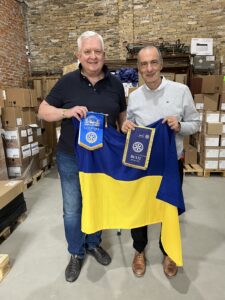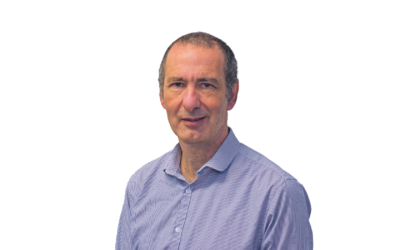Borys Bodnar is surrounded by a group of Rotarians in a warehouse north of Lviv. With Rotary International General Secretary, John Hewko, among the group, they are chatting away in rapid Ukrainian.
Then, aided by a crutch following a recent hip operation, Borys steps away from the group, holds out a hand and in an unexpected Home Counties’ accent offers: “Welcome to Ukraine, Dave.”
Listen to this article
From Leicester, via London and Geneva, this is Borys’s manor; the distribution hub into which Rotary humanitarian aid from across the world flows which is then transported across Ukraine. It’s an Aladdin’s cave with boxes of water filters, clothes, medical equipment and even photocopiers lining this spartan-looking warehouse.
“This is the Lviv Rotary relief hub which is run by three or four Rotary clubs, including mine which is a passport club, the Rotary Club of Ukraine Unity,” explained Borys. “We have been using this small warehouse for the past year. Before that, we were using people’s garages to store goods.
“The throughput is enormous and is very difficult to measure. We can unload an articulated lorry here, though it’s pretty tight.
“We’ve received boxes of equipment for cleaning water. Last autumn we received a disaster grant to provide thermal underwear for the winter, which we sourced from England, and we receive a lot of medical supplies from the Mainz and Ingelheim Rotary Clubs in Germany.”
I can’t go to the front, but I still feel an obligation to do something to help.”
They are preparing for their fifth consignment right now, and each one is worth $130,000.
“We’ve received lots of first aid kits, lots of generators, lots of warm clothing, lots of pretty much everything.”
The aid is distributed from the Lviv hub to all points in Ukraine, particularly the east and south of the country close to the front line. They respond to specific requests for aid which is shared among the global Rotary network to source those items. Over the past 16 months, around $30 million of aid has passed through the Lviv hub.
He explained: “We are constantly gathering information, communicating with people every day to understand what is needed. We then speak to colleagues outside of Ukraine, explaining what we are focused on in the short, medium and longer term.”
Borys cited an example of working with Michael Fernando, a Past District Governor for Somerset, parts of West Wiltshire and West Dorset (District 1200), who is actively involved, leading the International Water, Sanitation and Hygiene Rotary Action Group (WASH) for Ukraine.


Boris Bodnar (left) and Dave King (right).
“Early on in the war, we set up a WASH group in Ukraine, and then established an international group working with Michael,” he added.
“Last night, we had a late Zoom call to see what we could do to accelerate incoming supplies of water purification, filtration, filters, tablets and powders in view of the catastrophe created by the bombing of the Kakhovka dam.
“The problem with access to safe drinking water is that it is going to continue for a long time, even when the war finishes. The rebuilding process will take a very long time, possibly decades, so we will be doing humanitarian projects for some time to come.”
If there are any positives to have come out of the war it is the relationships which have grown with Rotary clubs and districts across the world, who Borys is in touch with every day.
Besides dealing with the massive logistical challenges against an ever-changing backdrop of war, the Lviv hub also faces the massive hurdle of funding.
It costs money to run the distribution centre, particularly transportation. And right now, they’re running out of it.
“We were receiving funding from a Rotary disaster response grant, but the funding ran out,” he added.
“We are in a queue for the Ukraine Response Fund and we can’t go the front of that queue. We have had some individual donations from clubs and districts into our district funds. What it means is that we are running out of money to distribute stuff. There’s no point receiving goods if we can’t send them along.
We are constantly gathering information, communicating with people every day to understand what is needed.”
“We’ve been using for some time a national courier service to distribute goods, Nova Poshta, with quite a hefty discount. Today we had 300 boxes of water purification powders to send to Kherson, the equivalent of 720,000 litres of safe drinking water. A Nova Poshta guy turned up in a van this morning, and tomorrow they will be there.
“The risk is that if we run out of money for logistics, the whole chain of humanitarian aid stops. It costs between $10,000 to $15,000 a month for logistics, which doesn’t sound like a huge amount of money, but it is for us.”
The Lviv centre is one of more than half a dozen active Rotary hubs spread across Ukraine, and one of the busiest.
“It’s easier to ask for important supplies, it’s harder to ask for money for logistics,” said Borys.
Born in Leicester to Ukrainian parents who fled their home country during the Second World War, Borys has lived in Lviv for four-and-a-half years. In terms of heading up the logistics in Lviv, Borys admitted he doesn’t think too deeply about the job.
“People, you know, have a coded sense of obligation,” he answered. “I can’t go to the front, but I still feel an obligation to do something to help. It’s a good dynamic and people do it because they want to.
“We are one country, and we feel very strongly that Lviv is the centre of Ukrainian identity.”


























































